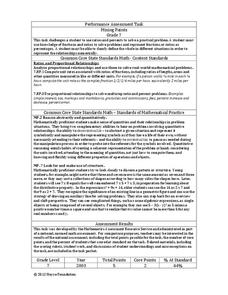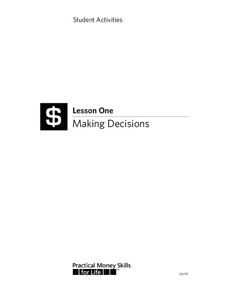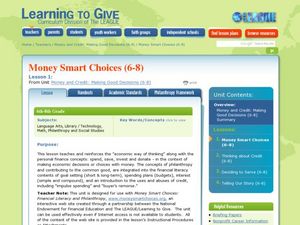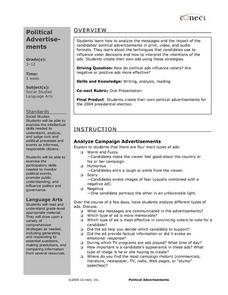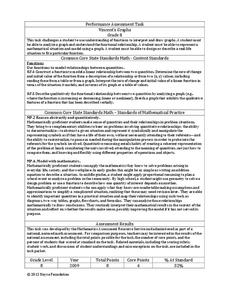Noyce Foundation
Photographs
Scaling needs to be picture perfect. Pupils use proportional reasoning to find the missing dimension of a photo. Class members determine the sizes of paper needed for two configurations of pictures in the short assessment task.
Noyce Foundation
Mixing Paints
Let's paint the town equal parts yellow and violet, or simply brown. Pupils calculate the amount of blue and red paint needed to make six quarts of brown paint. Individuals then explain how they determined the percentage of the brown...
EngageNY
Complex Numbers and Transformations
Your learners combine their knowledge of real and imaginary numbers and matrices in an activity containing thirty lessons, two assessments (mid-module and end module), and their corresponding rubrics. Centered on complex numbers and...
Curriculum Corner
7th Grade Math "I Can" Statement Posters
Translate the Common Core math standards into a series of achievable "I can" statements with this collection of classroom displays. Offering posters for each standard, this resource is a great way to support your seventh graders as they...
Alaska Department of Education
Mathematics Reference Sheet
Triangles and prisms don't stand a chance when your learners use this handout full of the formulas they need to know about the different shapes. Area, volume, and surface formulas are all covered along with the standard measurement and...
Noyce Foundation
Cereal
Find the best protein-packed cereal. The short assessment task covers equivalent and comparing ratios within a context. Pupils determine the cereal with the highest ratio of protein. A rubric helps teachers with point allotments for...
Curriculum Corner
7th Grade Math Common Core Checklist
With so many math standards to fit into a school year, it can be difficult keeping track of what you have and have not covered. This collection of Common Core checklists allows you to maintain a running record of when each standard was...
Beacon Learning Center
Bowling Over the Order of Operations
Upper graders will solve equations using order of operations, and create equations that to play a fun math bowling game. They will bowl using dice to practice operations. Extensions are also included.
Visa
Making Decisions
What economic factors can influence personal and financial decisions? In an effort to understand opportunity costs and the time value of money, pupils engage in role-playing activities and discussion, as well as view a PowerPoint...
Curated OER
Investigation- What Does It Cost?
Eighth graders investigate percents by comparing different discounts on the same sale item, practice graphing percents, and look at reasonable and unreasonable "percents off" a sale item.
Curated OER
Money Smart Choices
Students make choices regarding money management. In this personal finance lesson, students explore budgets, incomes, and expenses as they learn vocabulary regarding personal finance and consider how to create personal budgets.
Curated OER
Money and Credit: Making Good Decisions
Middle schoolers participate in activities that teach them how to manage money. In this managing money lesson plan, students set long and short term goals for economic success by having discussions, identifying benefits of saving, and...
Curated OER
Political Advertisements
Students are shown how to analyze the messages and the impact of the candidates' politicial adertisements in print, video, and audio formats. They are shown the techniques that candidates use to influence voter decisions and how to...
Illustrative Mathematics
Combined Fuel Efficiency
Practice simplifying complex fractions and long division of polynomials with this brief exercise. These four questions make a challenging warm-up activity or a short, but comprehensive, follow-up after a detailed lesson on algebraic...
Texas State Energy Conservation Office
Cost-Effective Buying
Middle school energy experts read about the relationship between energy use and cost-efficiency. Then they work through a couple of scenarios to determine which approach is more cost-effective.
Inside Mathematics
Vencent's Graphs
I like algebra, but graphing is where I draw the line! Worksheet includes three multiple-part questions on interpreting and drawing line graphs. It focuses on the abstract where neither axis has numbers written in, though both are...
Inside Mathematics
Quadratic (2009)
Functions require an input in order to get an output, which explains why the answer always has at least two parts. After only three multi-part questions, the teacher can analyze pupils' strengths and weaknesses when it comes to quadratic...
Curated OER
My Test Book: Calculating Percents
In this online interactive math skills activity, students solve 10 multiple choice math problems that require them to calculate percents. Students may view the correct answers.
Curated OER
Investing
Students collect data on investments and draw conclusions. For this algebra lesson, students analyze exponential graphs as they relate to money. They discuss the cause of an account balance being high or low.
Curated OER
Spend, Save, Invest or Donate
Students explore the concept of philanthropy. In this personal finance instructional activity, students consider economic choices and why people donate to causes. Students investigate the processes of borrowing money and investing money...
Curated OER
Percents and Discounts
Students convert between decimals and percents. In this algebra lesson, students define percent as it relates to sales and tax. They calculate the percents of number using multiplication.
Curated OER
Every Breath You Take
Pupils explore the nature of the air we breathe by observing petri dishes that have accumulated particulate matter from the atmosphere. Students make mathematical calculations and inferences about the effect of this matter on breathing....
Curated OER
Paper Airplanes
High schoolers study paper airplanes. In this lesson on aerodynamics, students print out the folding directions for making paper airplanes and after making the planes test their paper airplanes to see how well each flies. High schoolers...
Curated OER
Dynamics
First graders review Frere Jacques and perform crescendos and decrescendos. In this music lesson plan, 1st graders also learn about the dynamics of music including piano, forte, mezzo piano, and mezzo forte.



